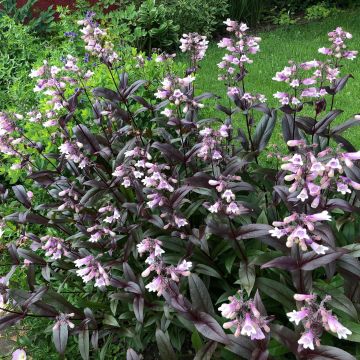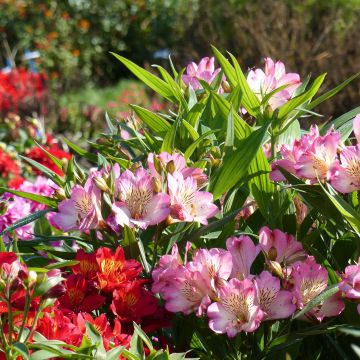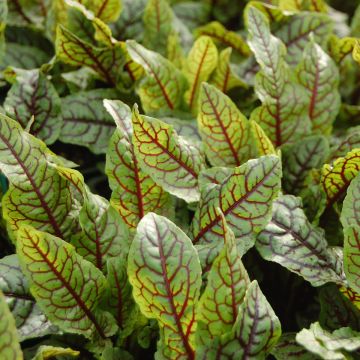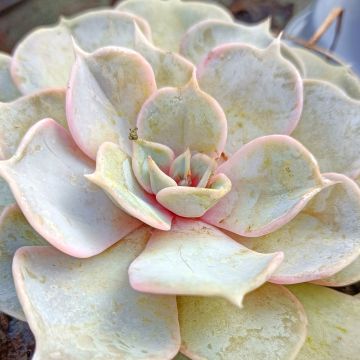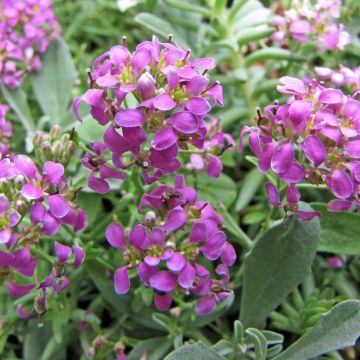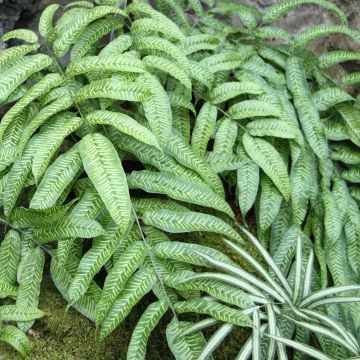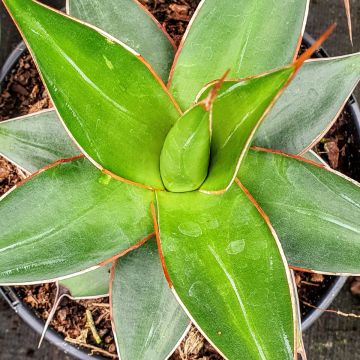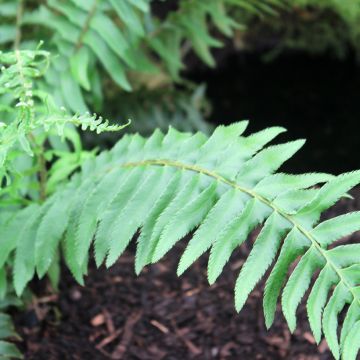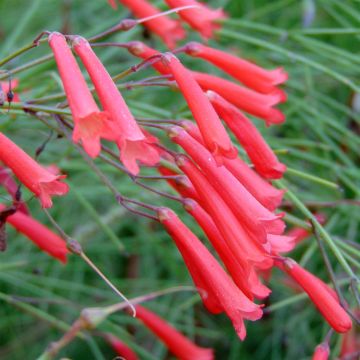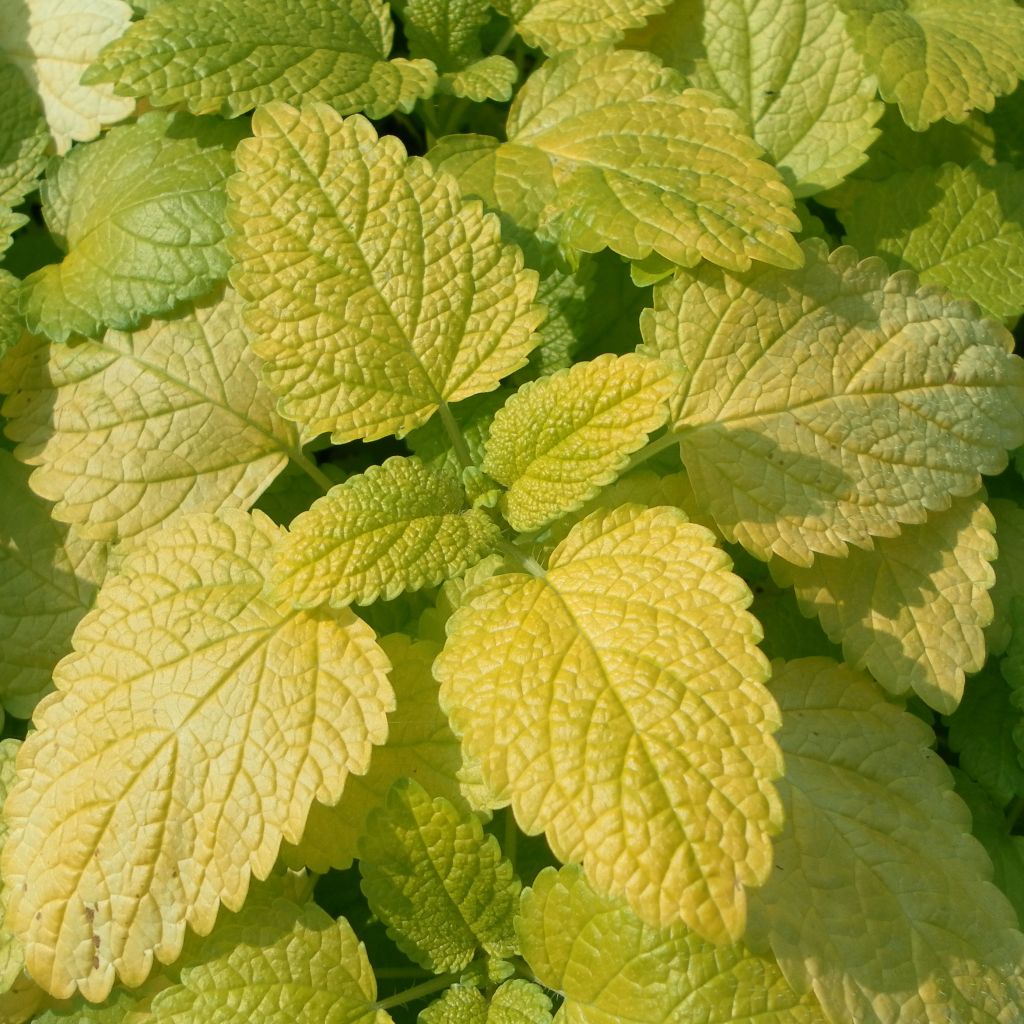

Melissa officinalis Aurea
Melissa officinalis Aurea
Melissa officinalis Aurea
Lemon Balm
This item cannot be shipped to the selected country
Delivery charge from €5.90
More information
Schedule delivery date,
and select date in basket
This plant carries a 12 months recovery warranty
More information
We guarantee the quality of our plants for a full growing cycle, and will replace at our expense any plant that fails to recover under normal climatic and planting conditions.
From €5.90 for pickup delivery and €6.90 for home delivery
Express home delivery from €8.90.
Does this plant fit my garden?
Set up your Plantfit profile →
Description
Melissa officinalis 'Aurea' is a semi-evergreen herbaceous perennial. It is a culinary and aromatic plant with variegated green and gold foliage.
Also known as yellow-leaved lemon balm, golden common balm, bee balm, lemon balm or French tea, Melissa officinalis 'Aurea' belongs to the Lamiaceae family. It is native to Asia Minor but quickly naturalised throughout the northern hemisphere. This plant has a highly branched and bushy habit, making it ideal as ground cover: its stems will reach 80cm (32in) in height and 40cm (16in) in width. The leaves are ovate, petiolate, and crenate. They turn a bright golden colour in spring, gradually transitioning to a medium green along the leaf's veins, and finally becoming variegated with green and gold. Semi-evergreen, the foliage may almost completely disappear during winter, but it will regrow as soon as the first warm spells arrive.
The flowers do not have any particular ornamental interest. Small and tubular, they appear in the axils of the leaves from June to August. Starting off very pale-yellow, they become rosy as the season progresses. It is worth noting that they are extremely honey-rich, as "Melissa" actually means "bee" in ancient Greek.
It prefers moist but not overly wet, deep, and light soils. The plant prefers slightly acidic soils and well-exposed locations. It is hardy down to -15°C (5°F). Mulch the area around the plant in regions with very cold winters to protect the roots.
Unlike mint, with which it is often confused, lemon balm does not reproduce spontaneously through stolons but through sowing. Therefore, even if no pruning is really necessary, it prevents seed proliferation and promotes the growth of new branches. It brings a bright touch to the garden. It has its place in a vegetable garden or herb garden thanks to its intense lemony fragrance. Use it as ground cover along borders or pathways. Play with colours by pairing it with the scarlet Nandina 'Fire Power', which has a similar stature. Together, their colours will evolve with the seasons. Combine it with the purple-lilac Monarda 'Prärienacht', which has a bergamot fragrance, and you will create an olfactory composition on the citrus theme.
Lemon balm has been used since ancient times as an ornamental, culinary, and medicinal plant. Melissa officinalis 'Aurea' has retained all the taste and therapeutic qualities of the typical variety. Think of it whenever you want to add a lemony note to your fish dishes, for example, by picking a few leaves from the plant. In herbal tea, it is reputed to calm digestive disorders and restlessness.
Report an error about the product description
Melissa officinalis Aurea in pictures
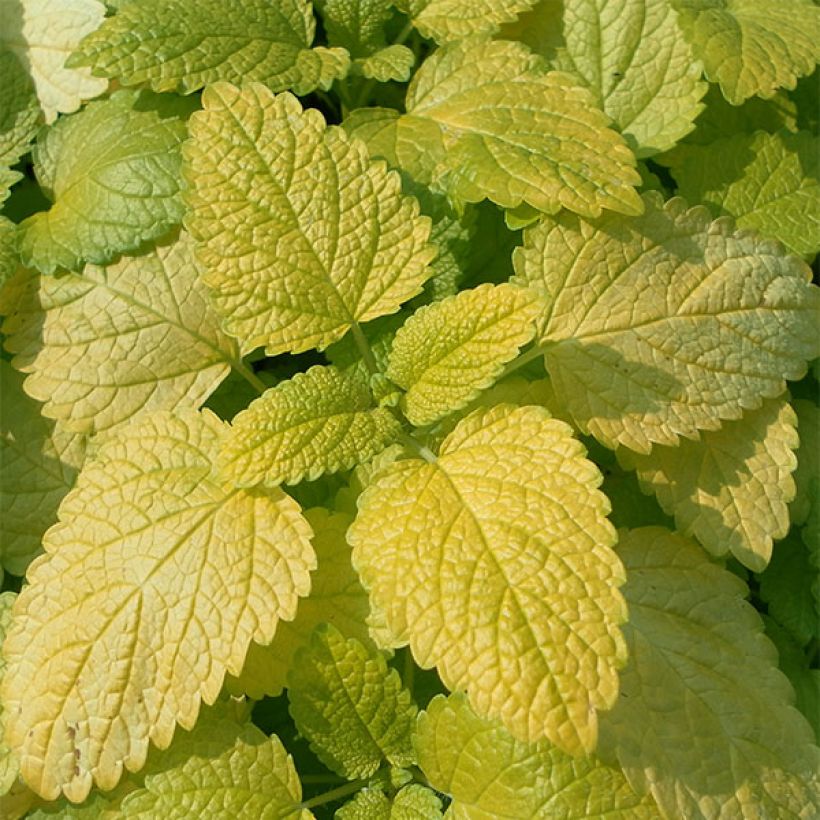

Flowering
Foliage
Plant habit
Botanical data
Melissa
officinalis
Aurea
Lamiaceae
Lemon Balm
West Asia
Other Perennials A to Z
Planting and care
Easy to grow in any ordinary soil. It tolerates clay soils well, in which it self-seeds spontaneously. In this case, only keep the golden stems to prevent the variety from degenerating.
Planting period
Intended location
Care
-
, onOrder confirmed
Reply from on Promesse de fleurs
Haven't found what you were looking for?
Hardiness is the lowest winter temperature a plant can endure without suffering serious damage or even dying. However, hardiness is affected by location (a sheltered area, such as a patio), protection (winter cover) and soil type (hardiness is improved by well-drained soil).

Photo Sharing Terms & Conditions
In order to encourage gardeners to interact and share their experiences, Promesse de fleurs offers various media enabling content to be uploaded onto its Site - in particular via the ‘Photo sharing’ module.
The User agrees to refrain from:
- Posting any content that is illegal, prejudicial, insulting, racist, inciteful to hatred, revisionist, contrary to public decency, that infringes on privacy or on the privacy rights of third parties, in particular the publicity rights of persons and goods, intellectual property rights, or the right to privacy.
- Submitting content on behalf of a third party;
- Impersonate the identity of a third party and/or publish any personal information about a third party;
In general, the User undertakes to refrain from any unethical behaviour.
All Content (in particular text, comments, files, images, photos, videos, creative works, etc.), which may be subject to property or intellectual property rights, image or other private rights, shall remain the property of the User, subject to the limited rights granted by the terms of the licence granted by Promesse de fleurs as stated below. Users are at liberty to publish or not to publish such Content on the Site, notably via the ‘Photo Sharing’ facility, and accept that this Content shall be made public and freely accessible, notably on the Internet.
Users further acknowledge, undertake to have ,and guarantee that they hold all necessary rights and permissions to publish such material on the Site, in particular with regard to the legislation in force pertaining to any privacy, property, intellectual property, image, or contractual rights, or rights of any other nature. By publishing such Content on the Site, Users acknowledge accepting full liability as publishers of the Content within the meaning of the law, and grant Promesse de fleurs, free of charge, an inclusive, worldwide licence for the said Content for the entire duration of its publication, including all reproduction, representation, up/downloading, displaying, performing, transmission, and storage rights.
Users also grant permission for their name to be linked to the Content and accept that this link may not always be made available.
By engaging in posting material, Users consent to their Content becoming automatically accessible on the Internet, in particular on other sites and/or blogs and/or web pages of the Promesse de fleurs site, including in particular social pages and the Promesse de fleurs catalogue.
Users may secure the removal of entrusted content free of charge by issuing a simple request via our contact form.
The flowering period indicated on our website applies to countries and regions located in USDA zone 8 (France, the United Kingdom, Ireland, the Netherlands, etc.)
It will vary according to where you live:
- In zones 9 to 10 (Italy, Spain, Greece, etc.), flowering will occur about 2 to 4 weeks earlier.
- In zones 6 to 7 (Germany, Poland, Slovenia, and lower mountainous regions), flowering will be delayed by 2 to 3 weeks.
- In zone 5 (Central Europe, Scandinavia), blooming will be delayed by 3 to 5 weeks.
In temperate climates, pruning of spring-flowering shrubs (forsythia, spireas, etc.) should be done just after flowering.
Pruning of summer-flowering shrubs (Indian Lilac, Perovskia, etc.) can be done in winter or spring.
In cold regions as well as with frost-sensitive plants, avoid pruning too early when severe frosts may still occur.
The planting period indicated on our website applies to countries and regions located in USDA zone 8 (France, United Kingdom, Ireland, Netherlands).
It will vary according to where you live:
- In Mediterranean zones (Marseille, Madrid, Milan, etc.), autumn and winter are the best planting periods.
- In continental zones (Strasbourg, Munich, Vienna, etc.), delay planting by 2 to 3 weeks in spring and bring it forward by 2 to 4 weeks in autumn.
- In mountainous regions (the Alps, Pyrenees, Carpathians, etc.), it is best to plant in late spring (May-June) or late summer (August-September).
The harvesting period indicated on our website applies to countries and regions in USDA zone 8 (France, England, Ireland, the Netherlands).
In colder areas (Scandinavia, Poland, Austria...) fruit and vegetable harvests are likely to be delayed by 3-4 weeks.
In warmer areas (Italy, Spain, Greece, etc.), harvesting will probably take place earlier, depending on weather conditions.
The sowing periods indicated on our website apply to countries and regions within USDA Zone 8 (France, UK, Ireland, Netherlands).
In colder areas (Scandinavia, Poland, Austria...), delay any outdoor sowing by 3-4 weeks, or sow under glass.
In warmer climes (Italy, Spain, Greece, etc.), bring outdoor sowing forward by a few weeks.


































